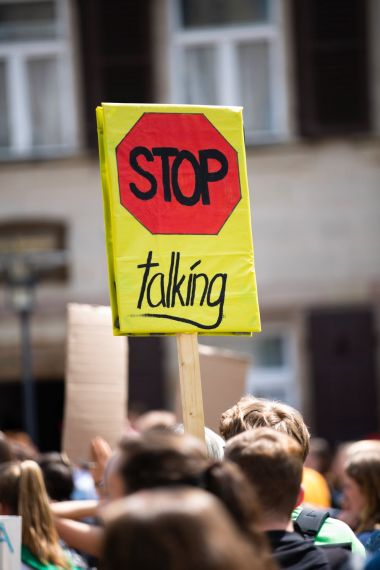Christians as much as anyone else need to listen to those they disagree with

'Entrenched' is a powerful image and sadly, it describes far too many of us. The BBC's Jon Sopel reckons it is the best way to understand how most Americans are reacting in the run-up to the presidential election too.
It would seem that little if anything will persuade them to change their minds about Mr Trump's suitability (or lack of suitability) to be president, not even the latest accusations about his tax returns. The New York Times, which says it obtained tax records for Mr Trump and his companies over two decades, claims he paid just $750 in federal income tax in both the year he ran for office and in his first year in the White House. It also claims he paid no income taxes at all in ten of the previous fifteen years. Mr Trump is quite clear of course: he denies the allegations that he avoided taxes and says it is simply 'fake news'.
But before we 'cast the first stone over the pond' we would do well to remember that 'entrenchment mode' can easily be our own default position. Owen Matthew provides us with an excellent example of this in his masterly account of the life of 'Stalin's Master Agent', Richard Sorge. Describing Sorge's "desperate attempts" to warn Stalin of the coming German invasion of the Soviet Union in July 1941, Matthews tells us that the warnings were "systematically suppressed by the top brass of the Red Army, terrified of contradicting Stalin's fixed idea that Hitler would never attack him".
We may not be "terrified of contradicting" our 'Great Leader' but I have come to the conclusion that far too few of us take the time to check our convictions as long as our prejudices are in working order! Western liberal democracies are displaying many of the symptoms of a sick society. Tribalism and populism are on the rise, with the result that we are increasingly likely to shout at each other rather than talk to one other. Reasoned debate is becoming vanishingly rare and I am convinced that this is because we have drifted away from our Biblical moorings.
Christians are not immune from this of course, because we can be just as strident and equally as tribal. But those of us who believe the Bible gives us a true insight into human nature must acknowledge the dignity that belongs to every human being, whatever their behaviour and however much we disagree with their opinions. God certainly treats us with respect and allows us the freedom to disagree with Him so why should we treat people any differently?
Christians should also be the first to admit that our understanding is always partial and limited. The apostle Paul talked of seeing things as if through a glass darkly, and so it is both arrogant and unloving to assume we have a complete grasp of the truth and have nothing to learn from others. Even our sharpest critics can teach us things if we are willing to reflect on what they have to say to us. Listening to and respecting the views of others is a dying art and in much need of emergency attention.
I have never forgotten a friend telling me that he believes the early church did more than 'outlive' the pagan world, it 'out thought' it too. I can see the sense in that comment. It's for this reason I believe the Church should be in the vanguard of those who argue for respectful dialogue, not least because we have been assured that God can help us demolish ideological strongholds if we have the courage to get out of our trenches. After all, the truth set people free. Entrenched attitudes may prove challenging, and ingrained habits may die hard, but nothing is impossible for God.
Rob James is a Baptist minister, writer and church and media consultant to the Evangelical Alliance Wales. He is the author of Little Thoughts About a Big God.
Views and opinions published in Christian Today are those of the authors and do not necessarily reflect the views of the website.











